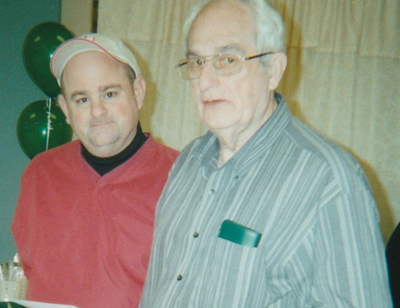My dad died 10 years ago today. I miss his physical presence, his words of
advice, and the comfort of a father’s love.
Last night, our family went to see the latest Avengers blockbuster
movie, End Game. Don’t worry, no spoilers for those who want
to see it and haven’t had the chance yet.
But there was one scene that I silently pondered as I went to bed last
night, and continued this morning.
One of the movie’s heroes, Tony Stark (Iron Man), traveled
back in time and had an encounter with his father. Much of the Iron Man saga involves Tony’s
struggles coping his dad’s death when Tony was a child. During the exchange, Tony had a chance to let
his dad know how much he appreciated all he had done for him.
That scene led me to think about what I would say to my dad
if I had the chance to speak to Him today.
I thought of all the life lessons I learned from my dad. I didn’t
realize what I was learning from him until much later in life.
So I want to share three life lessons I retrospectively learned from my dad.
Moments Matter
I have a lot of memories of doing things with my dad. Some of those were the big events like
vacations, significant life events, and celebrations. But many of my memories today are of simple
moments my dad and I spent together, just the two of us.
I remember conversations we had while riding down the road,
just the two of us. Also, I remember sitting
together while watching ballgames on TV. I can remember working together on
projects around the house.
I remember the time my dad showed me the old church and the
spring fed pool where he was baptized. I
remember going to work with him when I was little and getting to eat out for
lunch. Hadden’s Cafeteria. Ponderosa
Steakhouse. Long John Silver’s. So many
others.
If you are a parent, the simple times we spend with our kids
will one day matter more than the stuff we bought them. Time is our most precious commodity. Why not invest most of it in the people that
matter the most.
Today Does Not Define
You
My dad and I were a lot alike. I was a smart-mouthed and cocky kid. (No surprise, I’m sure). My dad was also a
bit, uhm, impetuous and would speak before thinking. You can imagine the interesting “extreme
family fellowship” that combination created.
Sadly, I look back and recognize that same impetuousness in me produced
similar consequences in my family.
But as my dad aged, he mellowed. Or maybe I grew up and didn’t push his
buttons as much. I like to think it was a grand combination of both. Whatever the cause, with age for both us came
sweeter memories.
I hope I mellow with age like my dad did. I hope that as I grow older I recognize
better what does and doesn’t matter. By God’s grace, I want to be able to see
the big picture better and act accordingly.
Parents, let’s take stock of the things that push our
buttons. Are they really that
important? Do they really matter that
much? Do they matter more than the person involved?
You Can’t Be Perfect,
So Be Good
I know my dad was not a perfect man. He had many flaws. Not as many as I do, but he had his fair
share. But his lack of perfection did
not keep him from being good. He was a
committed Christian who lived life the right way. He sinned like all of us do. But at the end of it all, the story arc of his
life showed that he allowed God to grow him.
I wonder if my dad laid in bed at night troubled by his lack
of perfection? Did he lose sleep
grieving over his “screw ups”? I know I
do with mine. Whether or not he did
that, he did NOT allow them to keep him from growing as a person.
I saw many of my dad’s flaws, and I am not so naïve to
believe there were many I didn’t see.
But in my eyes, his imperfection never obscured his goodness. Imperfections and all, I sit here to day and
assess his life as good. This imperfect man had a superlatively positive impact
on me.
Parents, you aren’t going to be perfect. You know it, and your kids know it. Therefore, quit trying to be perfect and just be real. Don’t let the inevitability of your imperfection keep you from being your best YOU. You are making a greater impact than you realize. Your kids may not realize it until you’re gone. But they will realize it.
Concluding Thoughts
Wow. This was more
difficult to write than I imagined when I started. I am glad to know when my dad entered the
presence of Jesus, he heard “well done, good and faithful servant.” He deserved to hear it. I wish I had the chance to tell him myself.
I hope to be 10% of the man my dad was. My prayer is my daughter will look back later in her life I remember moments. Consequently, I hope she will realize that in spite of my besetting imperfection that I love her and want God’s best for her.










